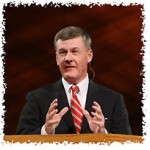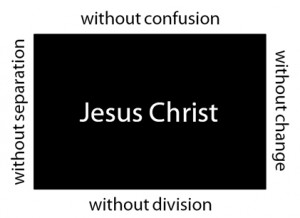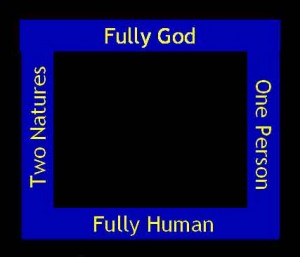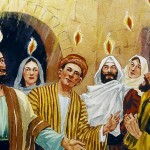 From page 13 of his book, The Pillars of Grace, Steve Lawson writes:
From page 13 of his book, The Pillars of Grace, Steve Lawson writes:
“… divine sovereignty in salvation involves each of the three persons of the Godhead – the Father, Son, and Holy Spirit. All three work in perfect unity to rescue the same undeserving sinners. Within the Trinity, there is one saving purpose, one saving plan, and one saving enterprise. Those whom the Father chooses are precisely those whom the Son redeems and those whom the Spirit regenerates. The persons of the Godhead act as one Savior. The Trinity is not fractured in its saving activity. It is not divided in its direction and intent, as if each person of the Godhead seeks to save a different group of sinners. Instead, each member of the Trinity purposes and irresistibly proceeds to save one and the same people – God’s chosen people.
Sadly, many believe otherwise. They insist that the Father saves only the few sinners whom He forsees will believe in Christ, this mistakenly confusing foreknowledge (Acts 2:23; Rom. 8:29-30; 1 Peter 1:2, 20), which means “forelove,” with mere foresight. They also imagine that Christ hypothetically died for all sinners – a different group from which the Father saves – naively assuming there is only one meaning for the scriptural words world and all. They further claim that the Spirit saves yet another group, that is, some sinners whom He woos. Sadly, they mistake His internal, saving call (1 Cor 1:2, 9) for a general, non-saving conviction (Heb. 6:4-5). According to this leaky scheme, the three persons of the Godhead are purported to be pursuing three different groups of individuals – few, all, and some. Thus, the persons of the Godhead are sorely divided in Their saving activity. Even worse, the sinner – not God – reigns as the determinative in his or her salvation.
But the Bible teaches otherwise. Scripture reveals a perfect unity within the Trinity, a perfect oneness between the Father, Son, and Spirit in Their saving activities. God’s Word teaches that the Godhead acts as one Savior in saving one people. The truth is that man is not sovereign in salvation – God is. All three members work together with absolute sovereignty and unwavering resolve to save the very same people for Their own glory. This is accomplished through the free exercise of the supreme authority of all three members of the Trinity.

 Matthew 24:36 says, “But concerning that day and hour no one knows, not even the angels of heaven, nor the Son, but the Father only.”
Matthew 24:36 says, “But concerning that day and hour no one knows, not even the angels of heaven, nor the Son, but the Father only.” These are intentionally very precise theological statements. It is vitally important we get this right. Heresy awaits all who would veer from this safe biblical position. At Chalcedon it was affirmed that Christ was “perfect/complete in Godhood also perfect/complete in manhood, truly God and truly man.”
These are intentionally very precise theological statements. It is vitally important we get this right. Heresy awaits all who would veer from this safe biblical position. At Chalcedon it was affirmed that Christ was “perfect/complete in Godhood also perfect/complete in manhood, truly God and truly man.” In the Incarnation, the second person of the Godhead became a man. Colossians 2:9 says, “For in him the whole fullness of deity dwells bodily.”
In the Incarnation, the second person of the Godhead became a man. Colossians 2:9 says, “For in him the whole fullness of deity dwells bodily.” “When the day of Pentecost arrived, they were all together in one place. And suddenly there came from heaven a sound like a mighty rushing wind, and it filled the entire house where they were sitting. And divided tongues as of fire appeared to them and rested on each one of them. And they were all filled with the Holy Spirit and began to speak in other tongues as the Spirit gave them utterance.” – Acts 2:1-4
“When the day of Pentecost arrived, they were all together in one place. And suddenly there came from heaven a sound like a mighty rushing wind, and it filled the entire house where they were sitting. And divided tongues as of fire appeared to them and rested on each one of them. And they were all filled with the Holy Spirit and began to speak in other tongues as the Spirit gave them utterance.” – Acts 2:1-4